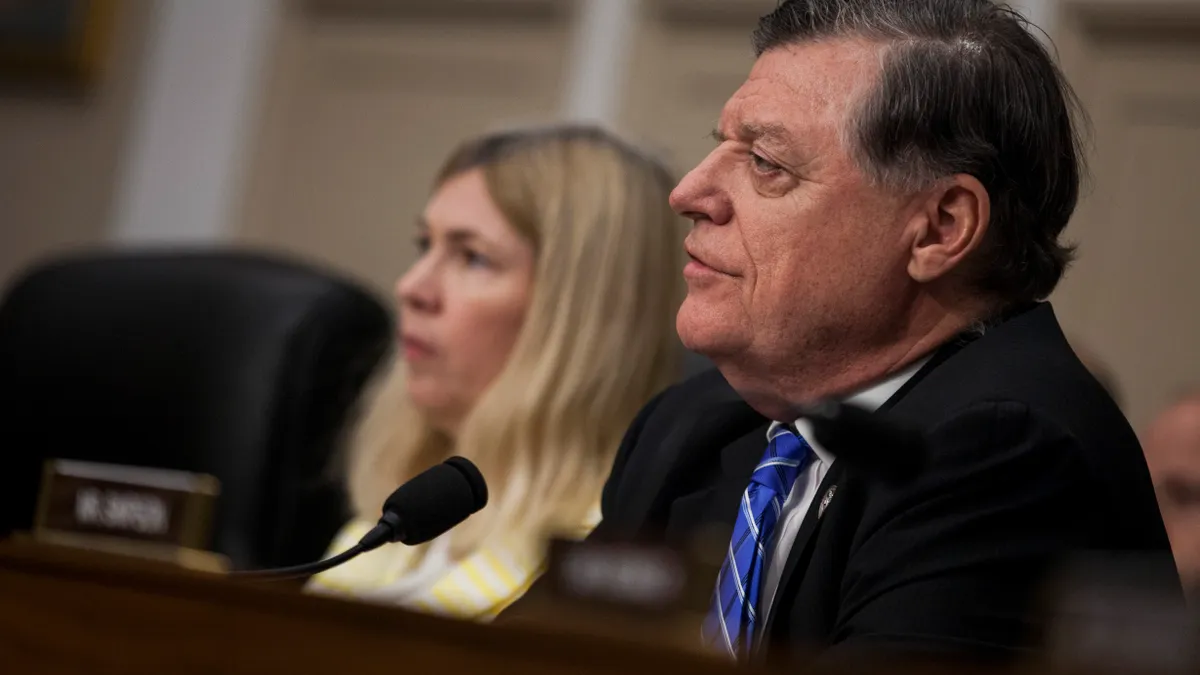Dive Brief:
- A House Appropriations Committee approved a markup for the Department of Labor’s fiscal year 2025 budget Wednesday, which includes a provision striking the agency’s rule allowing pension fund managers to consider ESG factors in investments.
- The bill would prevent Labor Department funding from being used to “administer, implement or enforce” the rule, according to the approved bill text. The legislation was approved with amendments and sent to the full House by a 31-25 vote July 10, split along party lines with committee Republicans in support.
- The budget bill is another front of attack for the regulation, which is also facing an ongoing lawsuit co-filed by 26 Republican state attorneys general, an energy company subsidiary and a trade group. After the petition was initially dismissed in the fall, a U.S. Appeals Court heard oral arguments Tuesday from the plaintiffs who have continued to protest the rule.
Dive Insight:
The Department of Labor’s “Prudence and Loyalty in Selecting Plan Investments and Exercising Shareholder Rights” rule has been in effect since 2023 and has faced continued challenges, both in the courts and by Republican-led House committees.
The rule included an update to the agency’s “tiebreaker standard” guidance, first issued in 1994 and periodically revised since. The 2022 revision allowed for pension fund managers to consider ESG factors in the event that they determine two or more investments will equally serve a plan’s financial interests, and it is imprudent to invest in both or all of the options.
In addition to preventing the agency from enforcing the ESG-related rule, the approved markup bill would also strike several other agency rules and reduce the Labor Department’s discretionary budget by 23% — $3 billion — below the enacted levels for fiscal year 2024, according to the markup summary. The $10.5 billion approved by the committee also falls $3.6 billion short of President Biden’s budget request, according to the summary.
Committee Chair Tom Cole, R-Okla. said in a Wednesday press release that the bill “reins in the Biden Administration’s burdensome overreach and divisive policy agenda.”
Earlier this week, a lawyer representing challengers to the rule argued before the U.S. Fifth Circuit of Appeals that the tiebreaker guidance creates a version of fiduciary prudence where “the duty of loyalty is essentially exhaustible.” The Labor Department’s lawyer objected to that view of fiduciary duty and told the judges — whether using ESG factors or a coin flip — “whichever of the options you pick, you are serving the financial interests of the plan.”
The case was previously dismissed by the Texas Northern District Court in September, but the dismissal’s reasoning relied upon the now-overturned Chevron doctrine. Both lawyers said they would be willing to argue the case again before the lower court given the new development. The Labor Department’s view is that the decision would be that same in a lower court under the Loper Bright Enterprises v. Raimondo ruling.
Last month, the House Appropriations Committee advanced a Financial Services and General Government Appropriations bill that would prohibit the Securities and Exchange Commission from enacting its climate-risk disclosure rule. The approved bill would also require the agency to submit a report detailing “the extent and limits of its authority in the implementation” of the regulation, according to the bill report.
The SEC has stayed implementation of its climate rule, approved in March, as the regulation works through its own legal challenges that have been consolidated into the U.S. Eighth Circuit of Appeals.
Both the House and the Senate Appropriations Committees have been working to pass FY2025 funding bills before FY2024 ends Sept. 28. The anti-regulatory policy riders in the House committee’s bills face an unlikely passage with a slim House majority and a Democratic-led Senate.
However, the government has used a continuing resolution to extend the bargaining deadline every year since 1998, according to the Bipartisan Policy Center. Given the uncertainty surrounding the presidential election cycle, the House Appropriations bills could serve as a policy signpost with a potential change in the balance of power in November.










